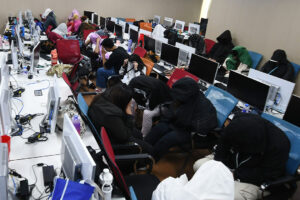By Luisa Maria Jacinta C. Jocson, Reporter
MONEY LAUNDERING activities are seen to decline after the implementation of a total ban on Philippine offshore gaming operators (POGO), the Anti-Money Laundering Council (AMLC) said.
“Considering that the POGO sector is highly vulnerable to money laundering activities, a total ban on POGOs may result in a reduction in money laundering opportunities within the gaming sector,” it said in an e-mail.
A risk assessment conducted by AMLC in March 2020 found that POGOs, considered internet-based casinos, are “highly vulnerable to money laundering.”
“Thus, the risk of money laundering within the gaming sector may decrease with the Philippine government’s ban on the operation of POGOs,” AMLC added.
President Ferdinand R. Marcos, Jr. during his State of the Nation Address last month ordered a total ban on all offshore gaming operations, citing their ties to illicit activities such as money laundering, prostitution and human trafficking.
The Philippine Amusement and Gaming Corp. was directed to shutter all POGO facilities by the end of the year.
The Philippines was among the top five countries in Southeast Asia with increased money laundering activities from 2018 to 2023, earlier data from Moody’s showed. Money laundering events in the Philippines jumped by 45% from 2022 to 2023, it added.
However, the AMLC clarified that the remaining action items set by the Financial Action Task Force (FATF) are related to the mitigation of risks associated with junket operations in casinos and not POGO operations.
In June, the FATF kept the Philippines on its “gray list” of jurisdictions under increased monitoring for money laundering risks for a third straight year.
The FATF said the country has acted on 15 out of its 18 recommended items. One of the remaining items that needs to be addressed is “demonstrating that supervisors are using anti-money laundering and counterfinancing of terrorism (AML/CFT) controls to mitigate risks associated with casino junkets.”
“We reiterate that POGOs are not related to the remaining action item concerning junket operations in casinos,” AMLC said.
“This means that the existence or absence of POGOs in the Philippines will not have an effect in addressing the action item pertaining to junket operations in casinos.”
Junkets are described by AMLC as “an arrangement between a casino and a junket operator to facilitate a period of gambling by one player or a group of players at a casino.”
These are casino marketing programs organized as a gaming tour for “high rollers” who travel to casinos to gamble. These junkets may involve transportation, lodging, casino rewards and the movement of funds to and from the casino, it added.
AMLC said the action item on casino junkets involves implementing anti-money laundering controls to mitigate risks in junket operations.
“Among such measures are the implementation of fit and proper tests on junkets, the use of appropriate customer due diligence mechanisms, and regular monitoring of transactions involving junket operations,” it added.
To further eliminate money laundering risks, AMLC said gaming regulators should enhance their AML/CFT controls.
“To further support decreasing risk in the gaming sector, casino regulators should continue to strongly implement the necessary risk measures, including robust compliance checking and enforcement of anti-money laundering obligations within the sector,” AMLC said.
“In any case, the Philippine government continues to implement all necessary measures to address all its remaining action items within the year to trigger the exit process.”
BSP Governor Eli M. Remolona, Jr. earlier said the Philippines could exit the gray list by next year.
Antonio A. Ligon, a law and business professor at De La Salle University in Manila, said eliminating POGOs will have a “strong positive impact” on investor sentiment.
“Anything that is aimed at stopping illegal activities and irregularities in the business community is welcome,” he said in a Viber message. “The harmful effects of illicit activities should not be ignored because of whatever earnings are derived from POGOs.”
The Makati Business Club earlier said the contribution of POGO investments was “minimal,” equivalent to 0.2% of gross domestic product in 2023.
The Finance department also said reputational risk from POGOs could cost the government P55.36 billion in forgone investments due to their criminal ties, as well as P29.01 billion in forgone revenues in tourism.
